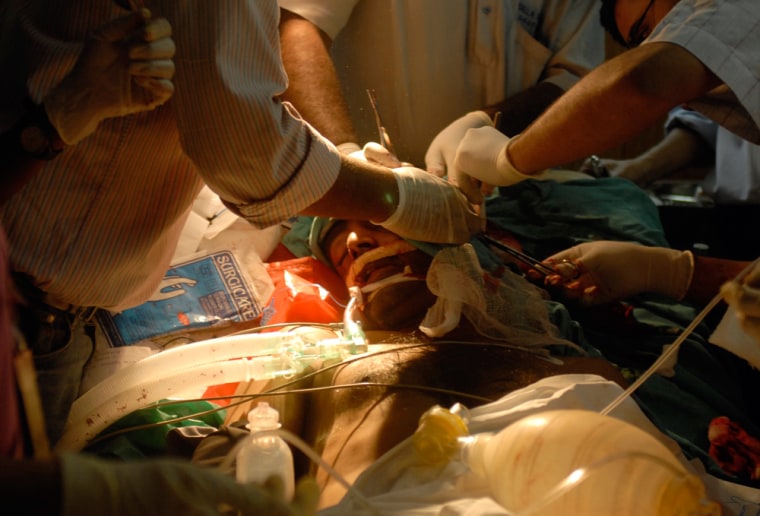A pair of almost simultaneous bombings blamed on Islamic extremists tore through a popular family restaurant and an outdoor arena on Saturday night, killing at least 42 people in this southern Indian city plagued by Hindu-Muslim tensions.
The restaurant was destroyed by the bomb placed at the entrance. Blood-covered tin plates and broken glasses littered the road outside.
The other blast struck a laser show at an auditorium in Lumbini park, leaving pools of blood and dead bodies between rows of seats punctured by shrapnel. Some seats were hurled 100 feet away.
Foreign groups responsible?
Officials said Sunday that foreign-based Islamic extremists may have been behind the attacks.
“Available information points to the involvement of terrorist organizations based in Bangladesh and Pakistan,” Y.S. Rajasekhara Reddy, the chief minister of Andhra Pradesh state, where Hyderabad is located, told reporters after an emergency state Cabinet meeting.
Reddy did not name any groups, but Indian media reports, quoting unnamed security officials, identified the Bangladesh-based Harkatul Jihad Al-Islami. Reddy declined to provide more details. “It is not possible to divulge all this information,” he said.
Harkatul, which is banned in Bangladesh, wants to establish strict Islamic rule in Bangladesh, a Muslim-majority nation governed by secular laws.
The Bangladeshi Foreign Ministry said Dhaka had not been informed of these allegations.
Witnesses described chaotic scenes in the aftermath of the bombings.
“We heard the blast and people started running out past us. Many of them had blood streaming off them,” said P.K. Verghese, the security manager at the laser show. “It was complete chaos. We had to remove the security barriers so people could get out.”
Most of the dead were killed in the Gokul Chat restaurant at Hyderabad’s Kothi market, said K. Jana Reddy, the state home minister. By Sunday morning, the death toll had risen to 42 as victims succumbed to injuries. Some 50 people were injured in the two blasts.
More bombs found, defused
Hindu-Muslim animosity runs deep in Hyderabad, where a bombing at a historic mosque killed 11 people in May. Another five people died in subsequent clashes between security forces and Muslim protesters angered by what they said was a lack of police protection.
Two other bombs were defused in the city Saturday, one under a footbridge in the busy Bilsukh Nagar commercial area, and another in a movie theater in the Narayanguba neighborhood, a police official said. Late-night movie showings were canceled across the city.
“This is a terrorist act,” said Y.S. Rajasekhara Reddy, the chief minister for Andhra Pradesh state, where Hyderabad is located.
Much of India’s Hindu-Muslim animosity is rooted in disputes over the Himalayan territory of Kashmir, divided between India and mostly Muslim Pakistan but claimed in its entirety by both countries. More than a dozen Islamic insurgent groups are fighting for Kashmir’s independence or its merger with Pakistan.
More than 80 percent of India’s 1.1 billion people are Hindu and 13 percent are Muslim. But in Hyderabad, Muslims make up 40 percent of the population of 7 million.
There has been little progress in the investigation into the May mosque bombing. Underlying the divide, Muslim leaders have said they do not trust local police to handle the investigation into the attack.
A series of terrorist bombings have ripped across India in the past two years. In July 2006, bombs in seven Mumbai commuter trains killed more than 200 people, attacks blamed on Pakistan-based Muslim militants.
